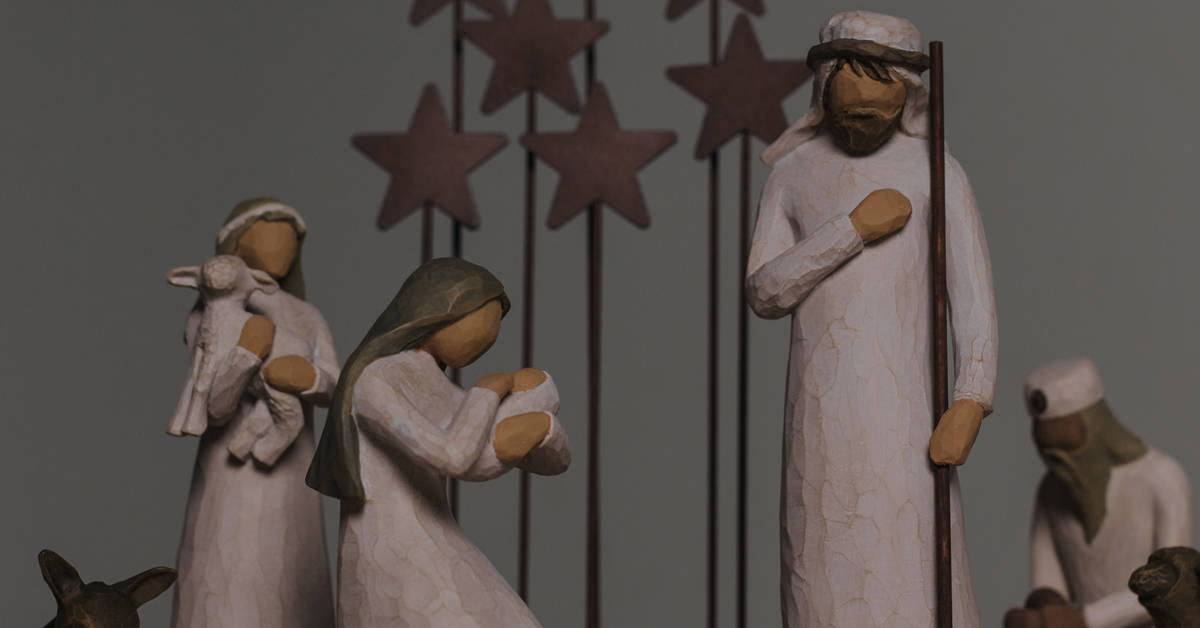
This post was written by Thomas Howard and originally published in Christianity Today in December 1973.
The most astounding and the most familiar story of all is the story of the Nativity. And this very familiarity may give us trouble, from time to time. We feel as though we ought to be perpetually awestruck by a tale of such wonders; we hold it to be true. But we find that we can rehearse the whole thing, just as we can rehearse the events of the Passion, and not really be “moved” by it. What is wrong? Are we so cloddish that we can speak of God with us, and of such marvels as the Virgin Mother and archangels and the star, without being profoundly moved every time?
The notion that we ought to be so moved fails to take into account one big psychological datum, and it is this: we human beings cannot remain for very long in any highly intense frame of mind, whether it be grief or joy or awe or anger or whatever. That is, no matter what the original stimulus may have been that aroused the feelings, we find that, after the first flush, there is a pattern of receding and surging, and that the crest does not stay fixed at some high point. We find a respite, and then perhaps a return periodically to the intensity of feeling.
Anyone who has experienced a death close at hand knows this. The grief is there, but the wild surges of uncontrollable feeling come only at irregular intervals. Or joy: we don’t remain for long, steady periods in any elevated state of tingling bliss. It comes and goes. And the same is true with awe: you may be thunderstruck with the first glimpse of the Grand Canyon, or of a Saturn rocket launching, or of the Queen of England. But the guide who descends daily into the canyon, or the electrician at Cape Kennedy, or the equerry in the palace becomes accustomed to the thing. He can’t maintain his original awe.
This is as it should be. We have to function. We have to get on with it. T. S. Eliot was right when he said that human kind can’t bear very much reality. If we had the whole abyss of mystery and splendor gaping straight at us all the time, we would be paralyzed, or worse, shriveled to a clinker. We would not be able to take it. Tradition used to say that the seraphim, those high and burning celestial lords, could gaze steadily at the Divine Glory; but whether or not they can, we mortals surely cannot.
And so we find, for one thing, that the approaches Heaven has made towards us are “tailored” to our humanity. Sinai was wrapped in thick clouds—and even that proved to be a bit much for everyone. The Shekinah was veiled inside the unapproachable place. And when God himself came to dwell among us, his glory was wrapped in the ordinariness of infant flesh.
But we find that, even with the thing brought low, as it were, our responses are hardly consonant with the immensity of the story. Here is the greatest event of all—God with us—and we do not leap to our feet in a transport of joy. Here is the greatest paradox of all—the Eternal Word incarnate as an infant boy—and we do not boggle.
A celebration of new life
But there is more. The event celebrated is the supreme point at which our ordinariness was attested to, as it were, by God himself taking our flesh, and our life was raised to glory. So that the things that make up our life here—work and eating and drinking and relationships and music and play and colors and sounds and smells and flavors—become, for the Christian, not simply chance details in a futile grind down toward oblivion but the very forms by which we participate in our appointed realm of the created order.
And so, in one sense, Christmas is the celebration of the birth of our Lord Jesus Christ; but it is more than a mere anniversary of a past event. It is the celebration of our life made new, of our humanness opened out to the possibility of glory; and therefore we bring everything that pertains to that humanness, and we deck this occasion with all of it, affirming that it all “belongs.” We call up, in song and pageant and picture and ceremony, the scenes and characters who appeared in that first drama: the Holy Family, Bethlehem, the shepherds, the angels, and the Magi. And we worship and feast and make merry in a hundred ways in honor of it all. We enact, in rituals of gaiety, and of giving and receiving, and of festooning and caroling, the joy that broke upon our world in that little town on that unlikely night.
This post was adapted from A Light Has Dawned: Meditations on Advent and Christmas (Lexham Press, 2020).







